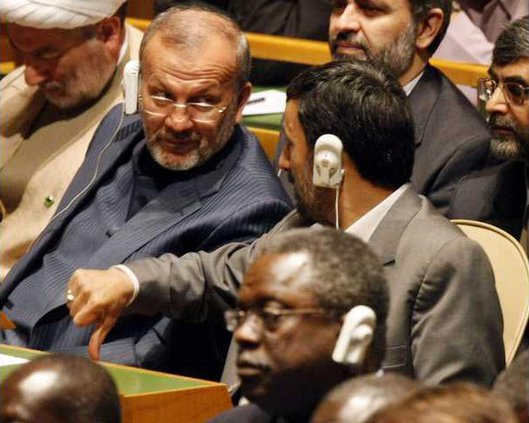UNITED NATIONS — Iran’s president blamed U.S. military interventions around the world in part for the collapse of global financial markets ahead of his speech Tuesday to the U.N. General Assembly.
President Mahmoud Ahmadinejad also said the campaign against his country’s nuclear program was solely due to the Bush administration ‘‘and a couple of their European friends.’’
‘‘The U.S. government has made a series of mistakes in the past few decades,’’ Ahmadinejad said an interview with the Los Angeles Times. ‘‘The imposition on the U.S. economy of the years of heavy military engagement and involvement around the world ... the war in Iraq, for example. These are heavy costs imposed on the U.S. economy.
‘‘The world economy can no longer tolerate the budgetary deficit and the financial pressures occurring from markets here in the United States, and by the U.S. government,’’ he added.
In a separate interview with National Public Radio, Ahmadinejad said he does not want confrontation with the United States.
Despite U.N. sanctions against Iran over its nuclear program, Ahmadinejad claimed vast international support for his position and said the campaign consisted ‘‘of only three or four countries, led by the United States and with a couple of their European friends.’’
Iran insists its nuclear activities are geared only toward generating power. But Israel says the Islamic Republic could have enough nuclear material to make its first bomb within a year. The U.S. estimates Tehran is at least two years away from that stage.
Ahmadinejad’s speech will come just hours after President Bush made his eighth and final speech to the U.N. General Assembly.
Bush said Tuesday the international community must stand firm against the nuclear ambitions of Iran and North Korea. And he said that despite past disagreements over the U.S.-led war in Iraq, members of the U.N. must unite to help the struggling democracy succeed.
‘‘A few nations, regimes like Syria and Iran, continue to sponsor terror,’’ Bush said. ‘‘Yet their numbers are growing fewer, and they’re growing more isolated from the world. As the 21st century unfolds, some may be tempted to assume that the threat has receded. This would be comforting. It would be wrong. The terrorists believe time is on their side, so they’ve made waiting out civilized nations part of their strategy. We must not allow them to succeed.’’
Throughout Bush’s speech, Ahmadinejad at in his seat and smiled and waved to people in the chamber. At one point during Bush’s 22-minute talk, Ahmadinejad turned to someone at his side and gave a thumb’s down.
Bush’s appearance was overshadowed by the U.S. financial crisis that has rippled through world markets. Trying to reassure world leaders that his administration is taking decisive action to stem market turmoil, Bush said he is confident that Congress will act in the ‘‘urgent timeframe required’’ to prevent broader problem. But he did not ask other nations to take any specific actions.
French President Nicolas Sarkozy called for a wholesale reform of the global financial system, urging major economic powers to meet before the end of the year to examine the lessons of the crisis.
‘‘Let us rebuild capitalism in which credit agencies are controlled and punished when necessary, where transparency ... replaces opaqueness,’’ Sarkozy said. ‘‘We can do this on one condition, that we all work together in our globalized world.’’
Brazil’s President Luiz Inacio Lula da Silva also called for a global solution to the financial crisis and lashed out at speculators whom he blamed for the ‘‘anguish of entire peoples.’’
‘‘The global nature of this crisis means that the solutions we adopt must also be global,’’ Silva said.
Secretary-General Ban Ki-moon painted a grim picture of a world facing not only a financial crisis but food and energy crises as well as new outbreaks of war and violence.
‘‘We must do more to help our fellow human beings weather the gathering storm,’’ he told world leaders. ‘‘I see a danger of nations looking more inward, rather than toward a shared future. I see a danger of retreating from the progress we have made, particularly in the realm of development and more equitably sharing the fruits of global growth.’’
‘‘We need to restore order to the international financial markets,’’ he said. ‘‘We need a new understanding on business ethics and governance, with more compassion and less uncritical faith in the ‘magic’ of markets. And we must think about how the world economic system should evolve to more fully reflect changing realities of our time.’’
———
Associated Press writers Slobodan Lekic and Michael Astor contributed to this report.
Iranian president blames US for market collapse


Sign up for the Herald's free e-newsletter